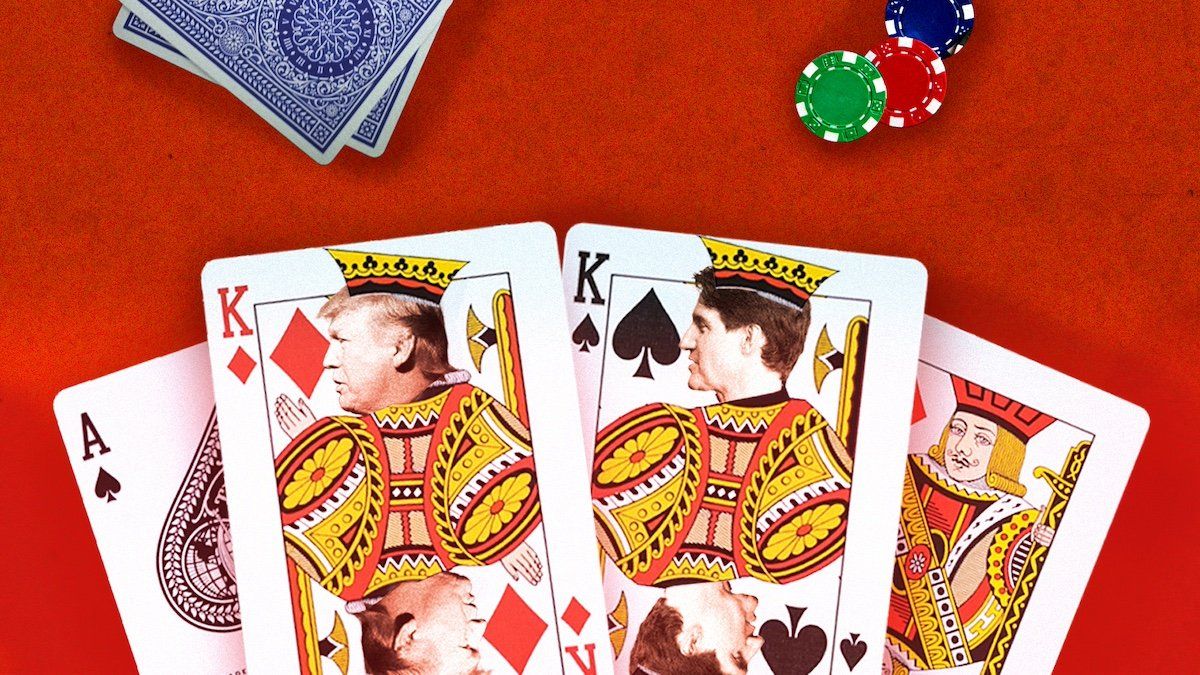Donald Trump, whatever else you might say about him, has a sense of humor.
“It was a pleasure to have dinner the other night with Governor Justin Trudeau of the Great State of Canada,” he posted at midnight on Monday. “I look forward to seeing the Governor again soon so that we may continue our in depth talks on Tariffs and Trade, the results of which will be truly spectacular for all!”
Trudeau, on the other hand, is a straight man.
“I think there’s a number of folks in different countries, and I won’t point out any particular one, where folks are going to be wondering about the choice they maybe made in elections,” he said earnestly in Halifax on Monday. “Let’s not be that kind of country in Canada … Let’s not fall into an easy trap of voting for change for the worse.”
Trudeau followed that with a lament Tuesday about Kamala Harris’ defeat, which led to a nasty attack by Trump supporter Elon Musk, who predicted Trudeau — whom he called a “tool” — would soon be gone.
The Trump team has decided to make Trudeau a target for pro-wrestling-style trash talk, and Trudeau is ill-equipped to respond in kind because Canadians are rattled by Trump’s threats and have little confidence in their unpopular prime minister. Ontario Premier Doug Ford, not Trudeau, threatened to cut off energy exports to the US after Trudeau met with Canadian provincial leaders on Wednesday.
Trump has all the cards
Trudeau said it would be “a little more challenging” to deal with Trump this time than last, when they together negotiated a trade agreement, but that is an understatement.
Eight years ago, when Trump took office for the first time, Trudeau had an approval rating of 50%, the Conservative opposition was in disarray, provincial leaders were mostly cooperative, and as few as 15% of Canadians approved of Trump.
As Trump gets ready to take office again, 26% of Canadians approve of him, compared with only 23% who approve of Trudeau. Yes, you read that right: In Canada, Trump is more popular than Trudeau.
In 2016, Trudeau was seen as glamorous. Now, he is the target of derision from conservatives in Canada, the United States, and around the world, a poster boy for the kind of woke liberalism that is in retreat everywhere.
This time, Trump holds all the cards, and Trudeau is in no position to bluff.
When Trump threatened to impose 25% tariffs on Canadian (and Mexican) imports if Canada doesn’t stop migrants and drugs from crossing the border, Canadian Conservatives urged the prime minister to take action immediately, proposed kicking Mexico out of the long-standing Three Amigos trade pact — do whatever he can, immediately — to prevent Trump from wrecking the Canadian economy.
What Trump wants
This is how Trump operates, says Christopher Sands, director of the Canada Institute at the Woodrow Wilson International Center for Scholars.
“Part of his negotiating tactic is to open with a threat, underneath which comes a request,” Sands says. “And with the first term it was, ‘I’m going to tear up NAFTA.’ We all ran in circles for a while, and then it became, ‘Well, unless Canada and Mexico come to the table and agree to negotiate to fix it.’ And in the end, that was the most important part of the message.”
Trump is a New York property developer, long accustomed to theatrical public negotiations.
“My style of deal-making is quite simple and straightforward,” Trump (or his ghostwriter) wrote in his 1987 book, “The Art of the Deal.” “I aim very high, and then I just keep pushing and pushing and pushing to get what I’m after. Sometimes I settle for less than I sought, but in most cases, I still end up with what I want.”
The problem for Canadians is that it is not yet clear what Trump wants, except to dunk on Trudeau. He has said that he wants Canada to do more to stop migrants and fentanyl crossing into the United States, but the scale of the problem at the northern border is a tiny fraction of the problem facing the southern border.
Telegraphing chaos
Tyler Meredith, who was the lead economic adviser to Trudeau until last year, thinks Trump is trying to establish Canada as a problem because the northern border will be the scene of chaotic events when Trump starts deporting migrants.
“I think Canada has been pulled into that in part because he’s focused on the problem vis-à-visMexico, but he’s also thinking about it in the Canadian context because he knows that some of those people that may be deported, or who will self-deport as asylum claimants, are going to end up in Canada,” he says. “So he’s kind of saying, ‘Look, be ready, because I’m about to do this, and I don’t want to be the one blamed for it, because I’ve given you sufficient warning.’”
Meredith thinks a tighter border may not be what Trump really wants — increased defense spending and changes to the USMCA trade agreement are likely what he will get around to eventually.
That could be painful for Canada. Trump’s appointments signal anything but business as usual. Robert Lighthizer, who provided a steady hand as Trump’s trade representative last time, is out. Peter Navarro, who in 2018 said “there’s a special place in hell” for Trudeau, is in.
The Canadians will be looking to start serious talks with calm officials, like Lighthizer, but may instead find themselves dealing with more volatile people, like Navarro, who will take their cues from the trash-talking commander in chief.
Trudeau knows that his only chance of political survival hinges on managing this file properly, and it’s ultimately in Trump’s political interest to keep the trucks moving across the border, but Trump has the opportunity and, seemingly, the desire to keep bullying Trudeau until they work out a deal.
